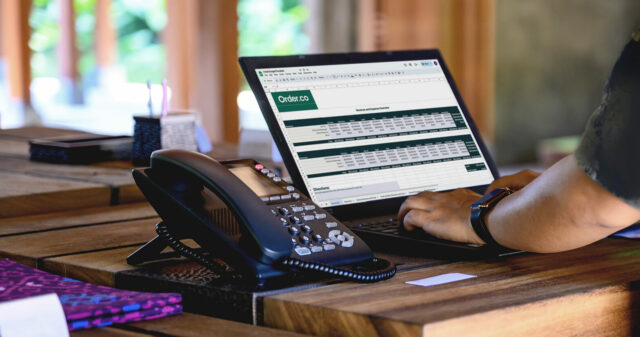Hotel Budgeting Template

Hotel Budgeting Template
Like all brick-and-mortar businesses, running a hotel requires careful planning and monitoring to keep profit margins strong. Using a budget template can help hotel owners understand and control expenses for long-term stability and growth.
Download the free tool: Hotel Budgeting Template
How to use this hotel budget template
To use the Order.co hotel budget template:
- Download the template from this link.
- Populate each template tab with actual or expected figures for revenue and expenses.
- Check the overview tab, which automatically populates totals by month and category.
What is a budget template?
A hotel budget template is a premade tool that outlines a hotel’s expenses and revenue, providing a simplified way to manage spending. It serves as a guide for allocating resources by categorizing and itemizing projected costs and revenues.
A budget template offers business owners a structured way to track finances, enable informed decisions, and recognize spending patterns. In the context of hotels, it helps forecast operational costs such as salaries, maintenance, marketing, food and beverage, and other overhead.
The template then compares these figures against anticipated revenue from room bookings, dining services, and events, enabling effective financial management and profitability planning.
What elements should I include in a hotel budget?
A budget doesn’t need to be complicated to be effective. When building your first hotel budget, incorporate details regarding revenue and expenses for the full scope of planning.
Revenue projections: Projected revenue estimates the income expected from various sources, including:
- Room bookings
- Dining services
- Events
Expense tracking: Expense tracking includes details about operational costs, such as:
- Salaries
- Maintenance expenses
- Marketing costs
- Food and beverage procurement
- Events costs
Benefits of maintaining a nimble budget process
Running any business without a budget is the equivalent of walking through a year wearing a financial blindfold. Building a strong and flexible budget offers security, visibility, and optionality should unexpected events crop up.
Budgets help keep spending in check to preserve profit margins while accomplishing the following:
Improved resource allocation: The real-time modifications possible with a flexible budget ensure current business objectives and operational realities align for resource allocation.
Stronger liquidity: Businesses that keep a tight rein on spending have more access to liquid cash for paying bills, making improvements, and handling emergencies.
Agility: A flexible hotel budget allows for quick changes in response to fluctuating market conditions, unexpected expenses, or new business opportunities. This optimizes resources and improves profitability.
Stronger strategic planning: With a well-crafted budget, businesses can plan effectively for contingencies and engage in strategic decision-making.
Enhanced financial control: Using a flexible template makes monitoring actual costs against the budget easier. This gives the finance team more control over the hotel's financial performance.
Better transparency: A dynamic budgeting process encourages transparent interdepartmental communication regarding financial expectations and outcomes.
7 Types of budgets used in hospitality
Operational: This is a detailed projection of all estimated income and expenses based on forecasted sales revenue during a given period (usually a year). It helps in managing day-to-day operations effectively.
Cash flow: This type of budget is used to predict the inflow and outflow of cash within the business. It aids in ensuring that the hospitality business has sufficient cash to meet its obligations.
Capital expenditure (CapEx): CapEx budgets are used for planning and controlling long-term investments like property renovations, new equipment, or expansion plans.
Food and beverage: Many hotels offer dining services within the property. Food budgeting accounts for the cost of goods sold (food and beverage), related labor costs, and other operating expenses.
Marketing: Marketing budgets are dedicated to marketing activities for enhancing brand visibility, attracting more customers, or launching new services.
Labor cost: This budget considers hotel payroll and employee benefits, seeking to manage wage costs while maintaining adequate staffing.
Revenue: A revenue budget forecasts the expected income from different sources. It includes room rentals, food and beverage sales, events hosting, etc., and helps businesses set realistic earnings goals.
What are the top challenges of hotel budgeting?
The top challenges of effective budgeting for hotels lie in accurately forecasting revenue and expenses amidst market volatility. Unpredictable factors like seasonality, economic fluctuations, and global events can drastically affect room occupancy rates and overall demand.
The diverse nature of hotel operations — from food and beverage to event hosting — requires careful allocation of funds across departments. Managing labor costs balances maintaining customer service quality and controlling expenses.
Achieving profitability through budgeting necessitates strategic planning and agile response to change.
Top 5 challenges in hotel budgeting
Variable revenue and seasonality
One of the top challenges in hotel budgeting is the unpredictability of revenue. This can be due to various factors such as seasonal demand, economic conditions, or unforeseen events like a pandemic.
Hard-to-control operating costs
Hotels have numerous operating costs, including utilities, maintenance, and supplies. Keeping these costs under control while maintaining high-quality services can be a significant challenge.
Labor costs
The hospitality industry is labor intensive. Fluctuating employee counts and scheduling complexities often make it difficult to budget labor costs accurately.
Capital expenditures
Budgeting for capital expenditures such as renovations or new equipment can be challenging. This is due to their high upfront costs and the inherent difficulty in predicting return on investment.
Marketing expenses
Determining how much to allocate to marketing activities is another challenge. Hotels must balance attracting new guests with retaining existing customers within their marketing budget.
How Order.co can help hotels optimize cash flow and stay within budget
While an Excel-based budget is a great first step in creating better efficiency and visibility, the complexity of hotel procurement makes software a better fit for the challenge. Order.co offers hotels flexible budget options while maintaining budgetary control and visibility. The platform offers customizable budgets that can be set according to user, location, product category, or cost center.
Order.co helps procurement teams stay on track beyond budget constraints through features like our controlled product catalogs, custom approval workflows, comprehensive spend reporting, and extended net terms.
Get started
Schedule a demo to see how Order.co can simplify buying for your business.
"*" indicates required fields


![7 Benefits to Building a Solid Procurement Strategy & How To Do It [2023]](https://www.order.co/wp-content/uploads/2023/04/iStock-1188425195-640x360.webp)
